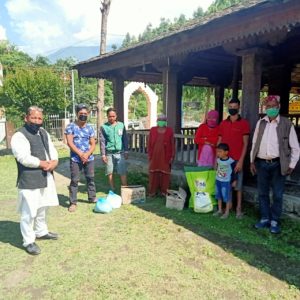 The COVID-19 Pandemic has upended the lives of millions of Indians with some sections of society much more proportionately affected than others. While there is an increasing recognition of the hardship faced by migrant workers and labourers, not much has been discussed about the negative consequences of India’s pandemic strategy on women.
The COVID-19 Pandemic has upended the lives of millions of Indians with some sections of society much more proportionately affected than others. While there is an increasing recognition of the hardship faced by migrant workers and labourers, not much has been discussed about the negative consequences of India’s pandemic strategy on women.
The Coronavirus pandemic has triggered what can be described as “Sanitary Pad/Napkin Crisis”.in India. In some parts of India schools play a critical part of the supply chain providing a pack of pads to girls each month. With lockdown supply chain was stopped and closed abruptly. The situation became worse when complete lockdown was announced on March 24th. This put an immediate stop to monthly supply of pads that millions of adolescent girls who received from schools and women those who received free supply from the Government. The production of sanitary napkins came to a screeching halt and lead stock outs in several localities.
Though sanitary pads have been included as essential commodity the shops were out of stock. There is no clear mention that sanitary pads is a basic requirement for maintaining period hygiene. Sanitary pads were reclassified as essential item even the supplies did not resume to normal in many places.
Environics Trust-Sanitary Napkin Unit stepped in to fill the vacuum created by the pandemic. We at Environics distributed free Sanitary Napkins to women and adolescent girls. More than six hundred packets containing ten pads each were distributed free of cost. Girls and women were also educated on maintaining good menstrual hygiene.
It was concluded that good menstrual hygiene is much more than just access to sanitary pads. Water, toilets and equitable gender norms also matter, they are essential in management of periods otherwise they are far from sustainable.
If anything positive outcome of COVID-19 crisis is that the world’s most stringent lockdown revealed the plight of vulnerable Indian migrant labour force.
The issue of migrant workers was one of the most cruel and highlighted issue in this pandemic where millions were rendered unemployed, stranded without money, food and shelter. Crossing the country’s highways to return to their villages and several meeting with accidents and deaths on way. Unemployment has rendered a large section as directionless, leaving the social health as well as economy in shambles.
There is also a silver lining to the impact of COVID-19. It brought together thousands to provide relief for stranded migrant workers, temporary shelters and basic amenities. Labour migration appeared in mainstream policy discussions for the first time.
Now is the moment to harness all these efforts. Unite them in wider movement for social change that will better the terms and conditions for migrant workers. If there is anything that long term work on seasonal migrant workers in India has shown it is the need to consider three things:-
- Better conditions and pay must be adopted both for workers’ households and for the workers in their place of work.
- Tracking discrimination against caste, tribe and religion based migrant is a must to lift oppression.
- Finally the internal oppressive structure drive countrywide uneven development, which forces people to move into such vulnerable conditions in places of work must be reversed.
Environics Trust enabled about 150 stranded migrant workers to reach home, provided them with temporary shelter and food packets.https://environicsindia.in/2020/08/31/direct-support-to-stranded-workers-2/
We distributed dry ration and sanitary napkins to about 134 households.
Click Here for Photos

Recent Comments